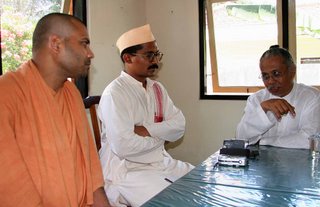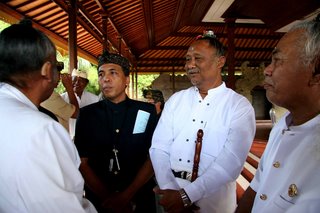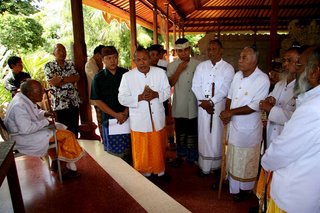
A quiet meeting today between the Indonesia Hindu Parisadha's Dharmadhyaksa Ida Pedanda Gde Ketut Sebali Tianyar Arimbawa and two spiritual figures from India; the Asia-Pacific Coordinator of Vishva Hindu Parisadh (World Hindu Council), Swami Vigyananand (center) and the president of the World Buddhist Cultural Foundation, Most Venerable Bhadant Gnana Jagat Mahathero (left) turned into a lively discussion when the conversation touched the controversial anti-pornography bill.
 Following a fluent visual presentation (above) by KRB's internet campaign coordinator Made Marlowe, Swami Vigyananand reminded the Balinese that they were living in a harsh world now with religious radicalization had approached the island's shore. "The radicalization, which has its origin in the Middle East, has now influenced Indonesia,” he said.
Following a fluent visual presentation (above) by KRB's internet campaign coordinator Made Marlowe, Swami Vigyananand reminded the Balinese that they were living in a harsh world now with religious radicalization had approached the island's shore. "The radicalization, which has its origin in the Middle East, has now influenced Indonesia,” he said.
The bill, Vigyananand argumented, was the manifestation of that religious radicalization, an effort to substitute secular laws with Shariah Islamic Law and remodel the nation into a sort of Afghanistan under Taliban rule.
“In this context, being kind and nice are not enough for the Balinese. You also have to have an effective, pointed strategy to face the challenges of this harsh world,” he stressed.
He offered one such strategy; building an international support for the Balinese people’s rejection toward the bill.
“Its about time that the Balinese people send a delegation to approach various international Hindu organizations, human rights institutions and the two strongest political blocs; the European Union and the United States,” he said.
Supports from various well-respected global organizations would form an effective political pressure to the government of Indonesia.
Vigyananand had provided the KRB with several contact persons and e-mail addresses of various international Hindu and human rights organizations.

(Ida Pedanda Sebali Tianyar clarifies several points to the visiting guests)
He conceded that the internationalization of the issue would probably irritate the Indonesian government. Yet, the domestic repercussion to the Indonesian Hindu could be minimized if the Balinese people managed to achieve to things.
First, convincing the central government that such action would not harm the integrity and sovereignty of the republic.
“There is no doubt that Bali is a part of Indonesia, no doubt whatsoever…,” he stressed.
However, he reminded, the culture of Bali was no longer the exclusive property of the Balinese, nor it was solely belonged to Indonesia.
“Bali has a cultural and spiritual heritage that belonged to the world, therefore, it is the responsibility of the world to save and protect that heritage,” he stated.
Second, establishing a solid alliance with other moderate forces in Indonesia, regardless of their ethnic origins and religious faiths.
“I believe that this (the bill) is a problem not only for Balinese or Hindu, but also for Javanese, Sulawesi-nese and the Moslems and Christians as well,” he said.
“Everyone have to be included in the movement and resist the bill as one unified nation,” he added.
Toward the end of the friendly meeting, Vigyananand stated that their support for the Balinese did not mean that he condoned pornography. Yet, he believed that pornography, or morality, was an issue that should be left to the society and not to the government.
“Moreover, we don’t want anybody, or any government, uses morality as a pretext to oppress the people’s freedom to celebrate its diverse cultural and religious heritage,” he said.
For the KRB’s activists, who were present in the meeting, including the chairman I Gusti Ngurah Harta and Cok Sawitri, Vigyananand’s exposition had strengthened their belief in the future success of the movement.
 (KRB's Marlowe shares his thoughts with Swami Vigyananand)
(KRB's Marlowe shares his thoughts with Swami Vigyananand)
 To put things into perspective, the anti pornography bill is not the only problem Bali has to deal with right now.
To put things into perspective, the anti pornography bill is not the only problem Bali has to deal with right now.

 Following a fluent visual presentation (above) by KRB's internet campaign coordinator Made Marlowe, Swami Vigyananand reminded the Balinese that they were living in a harsh world now with religious radicalization had approached the island's shore. "The radicalization, which has its origin in the Middle East, has now influenced Indonesia,” he said.
Following a fluent visual presentation (above) by KRB's internet campaign coordinator Made Marlowe, Swami Vigyananand reminded the Balinese that they were living in a harsh world now with religious radicalization had approached the island's shore. "The radicalization, which has its origin in the Middle East, has now influenced Indonesia,” he said.
 (KRB's Marlowe shares his thoughts with Swami Vigyananand)
(KRB's Marlowe shares his thoughts with Swami Vigyananand)
